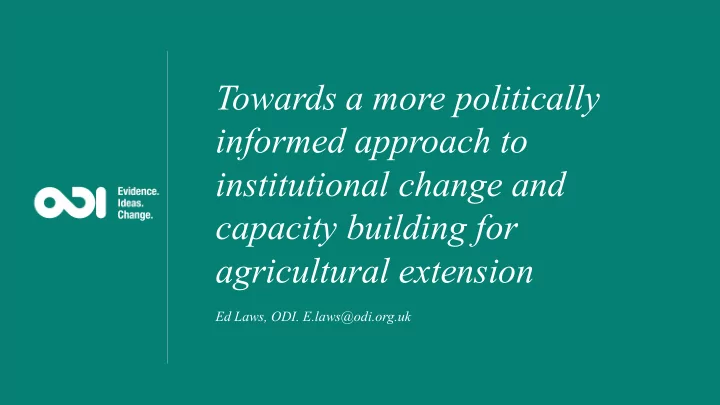

Towards a more politically informed approach to institutional change and capacity building for agricultural extension Ed Laws, ODI. E.laws@odi.org.uk
Common political/governance challenges in agricultural extension and capacity building • Lack of commitment in government • Poor co-ordination • Norms/expectations around gender • Lack of effective collective action • Political capture
Areas to cover • ‘Thinking and working politically’ and ‘adaptive management’ for institutional change • Tools and frameworks for doing this • Applying these ideas about institutional change and capacity development to agricultural systems #hashtag
Working politically and adaptively for institutional change • Institutional change requires understanding and engaging with politics and power – hence the need to think and work politically • Institutional change requires engaging with complex and unpredictable systems – hence the need for more adaptive ways of working
Donors, practitioners and researchers are increasingly embracing these ideas Increasingly, aid programmes have to show how they’re ‘doing’ TWP or being adaptive Communities of practice have formed to cement these principles and share experience and good practice #hashtag
ODI’s main engagements in this space LearnAdapt – working with the UK’s Department for International Development (DFID) to build flexible systems, processes and tools Global Learning for Adaptive Management - promoting rigorous evidence- based approaches to adaptive management
From theory to practice • The social and political environment will inevitably have an influence on how agricultural systems operate • How do we build a better understanding of that environment? • We can start with political economy analysis to understand how structures, agents and institutions interact to drive or block change and why
Three levels of PEA
Sector-level PEA – Key areas for analysis Stakeholders Corruption and rent-seeking Ownership structure and financing Ideologies and values Power relations Decision-making Historical legacies
Sector-level PEA – Nepal health sector • Understanding how the transition to federalism will affect health delivery • Digging deeper into the political economy factors behind staffing shortages in rural areas - patterns of corruption, rent-seeking and political capture. • Collective action problems that are bound up with poor institutional integrity
Problem-driven PEA – stakeholder mapping
Country or macro-level PEA • Political prioritisation • The visibility and ‘political returns’ of your activities • Patterns of demand and accountability • Structural features that interact with political economy
TWP and institutional change in Tanzania: sunflower production and taxation • Institutions for Inclusive Development (I4ID) (DFID + Irish AID) • Spotting a window of opportunity for policy change • Mapping key stakeholders • Building a coalition in support of reform • Leading to tariff changes that should result in a positive outcome for smallholder farmers
I4ID stakeholder map Category A: High Power-Low Interest Category B: High Power – High Interest • • Prime Minister Office of the President • • Speaker of the National Assembly Ministry of Agriculture • • Ministry of Finance Large scale processors • • Ministry of Trade Tanzania Revenue Authority Local Government Authority • MPs from Budgeting and Agricultural committees and from sunflower production areas Category C: Low Power – Low Interest Category D: Low Power - High Interest • • Ministry of Communication, Science &Technology Smallholders farmers • • Former leaders Civil society organisations e.g. the Agriculture Non-State Actors Forum (ANSAF) • Tanzania Private Sector Foundation (TPSF) • Confederation of Tanzania Industries
Key takeaway principles for thinking and working politically How can we make progress on low commitment, co-ordination and collective action problems, gender equity and elite capture? 1) Support inclusive local leadership • Engage with local individuals, organisations or movements • Binging diverse actors together • Nurture locally driven change processes
How can we make progress on low commitment, co-ordination and collective action problems, gender equity and elite capture? 2) Work with the grain • Focus on issues with local traction • Find ways of securing the support of powerful players • Find a balance between principle and pragmatism
How can we make progress on low commitment, co-ordination and collective action problems, gender equity and elite capture? 3) Embrace uncertainty and learn through adaptation • Using M&E in creative ways to support learning • Work with local partners to flex and adapt • Embrace the long-term nature of change
Thank you! e.laws@odi.org.uk @EWDLaws
Recommend
More recommend